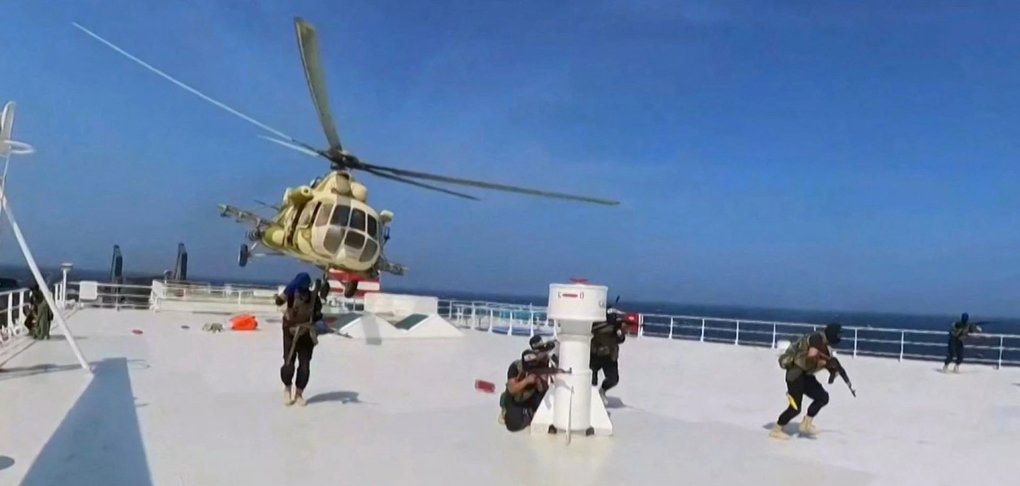(Dan Tri) – From IKEA furniture to children’s toys and cars, British shoppers may see delays in some of their favorite household items as the Red Sea conflict continues to destabilize
Houthi released images of their gunmen raiding and seizing cargo ships related to Israel in the Red Sea on November 19, 2023 (Photo: AFP).
In the small sea of the Middle East, dangers are lurking.
The cause is due to attacks by Houthi forces in Yemen, who support the armed group Hamas in the war with Israel and oppose US-Israeli influence in the Middle East.
To show support for Hamas, the Houthis have targeted commercial ships in one of the world’s busiest shipping lanes: the Red Sea.
Tea People, a premium tea business, was unable to receive goods in time to sell on Christmas because the train had to take a detour with an additional 5,600km route.
Vishaka Chhetri Agarwal, the company’s product manager, said costs had quadrupled: `Normally, to ship a container from Sri Lanka to the UK, it only costs $1,000 but now suddenly we
Red Sea: Conflict can explode and spread at any time
Global shipping has become a target for the Houthis as the war between Israel and Hamas continues to heat up.
Since then, the Houthis – who control much of Yemen and are believed to be linked to Iran – have launched UAVs and anti-ship missiles at more than 20 ships, mainly those linked to Israel or sailing there.
According to maritime risk management group Ambrey Analytics, from November 19, 2023 to January 2, 47 incidents were reported in the Red Sea and Gulf of Aden, of which 12 recorded material damage.
On December 13, 2023, the British warship HMS Diamond shot down an attack UAV suspected of targeting commercial ships in the Red Sea.
However, Britain is not alone in its deterrence efforts.
In response to Houthi attacks, the US and 12 other countries – including the UK – established a naval task force, conducting the `Defender of Prosperity` campaign to protect civilian ships.
Experts warn that the situation could still escalate as the West tries to balance its ability to deter with its willingness to use it.
Raphael Cohen, director of strategy and doctrine programs at RAND AIR FORCE, said: `The US as well as the international community have tried to avoid causing real damage to the Houthis… And they have good reasons.`
He said: `The US and its allies are torn between their goals of curbing tensions in the region and should use less force. But on the other hand, the current state of attacks on international shipping is unacceptable.`
Goods must take a detour
The cost of rising tensions in the Red Sea is not only political but also commercial.
The United Nations Security Council on December 1, 2023 declared: `The Houthis will suffer consequences if they continue to threaten lives, the global economy and the free flow of trade on important sea routes.`
Large corporations such as BMW, IKEA and Nestle are said to be heavily affected after several shipping lines – including Maersk and Hapag Lloyd – suspended sailings through the region.
Before tensions escalated, about 12% of global trade and 40% of goods from Europe to Asia passed through the Red Sea and the Suez Canal.

Location of the Red Sea and Suez Canal (Photo: SMH).
Now, shipping companies have rerouted ships around the Cape of Good Hope, a journey that takes an average of 10 more days and costs about $2 million more in fuel and other costs.
So far, about 300 ships have been rerouted, according to data from Windward, 45 of which were carrying new cars from South Korea and Japan at a value of about $100 million each.
The company said the number of cars shipped on the route was longer, more expensive, and the average price increase per retail car was $1,100.
Mr. Daniel, who was on an Israeli Navy ship that was hit by a missile off the coast of Lebanon in 2008, killing four of his comrades and injuring 12, said: `I completely know the feeling of being hit by a missile.
Stawpert, senior director of environment and trade at the International Chamber of Shipping, said there was a risk of `serious casualties`, but a scenario with no ships passing through the route seemed unlikely.
`Shipping is very resilient and we have faced a lot of security threats in the past but always found a way to overcome them,` he said.
However, large container ships may be diverted because `they are much easier targets to attack than low-height ships such as oil tankers.`


